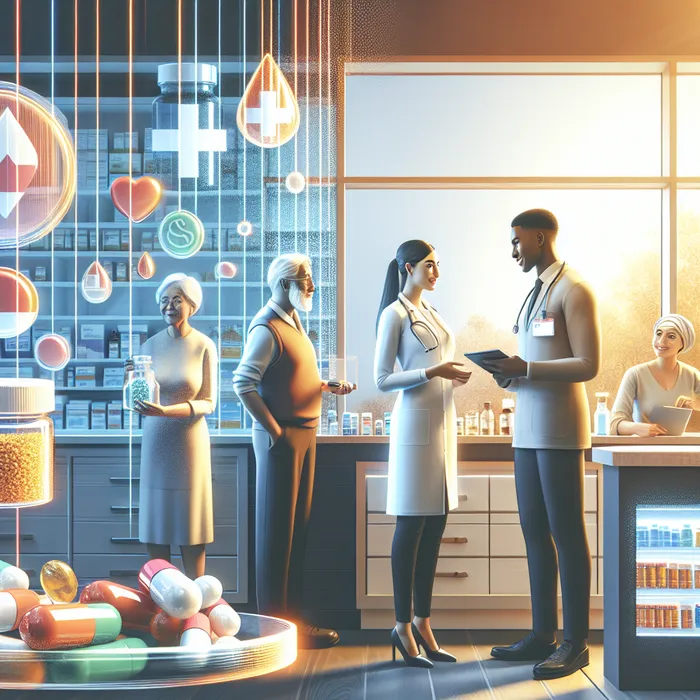Why consulting your pharmacist is a smarter first step for health advice than Google

While the internet is a convenient starting point, it’s no substitute for the expertise of a trained pharmacist.
Image: Kaboompics.com/pexels
We’ve all been there. You notice a strange ache, an unfamiliar rash, or a stubborn cold, and the first thing you do is search online for answers. Before you know it, you’re convinced it’s something serious.
Studies show that over two-thirds of Americans and 69% of Canadians head straight to the internet for health information.
In South Africa, where almost 60% of the population has internet access, the trend is just as common.
The problem is, search engines don’t know anything about you. They can’t take your age, medical history, or personal health needs into account. Even worse, much of the information online is outdated or simply incorrect.
Pharmacists do much more than fill prescriptions. They are highly trained healthcare professionals who can give you reliable, personalised advice without needing an appointment.
From explaining your medication and spotting harmful drug interactions to sharing practical lifestyle tips, pharmacists are a great source of knowledge.
Patients are increasingly using Google before consulting a healthcare professional about their symptoms, noted Dr Marion Morkel, Sanlam's chief medical officer, to The Health Funders Association.
While the internet is a convenient starting point, it’s no substitute for the expertise of a trained pharmacist.
To show just how invaluable they are, here are seven everyday health questions your pharmacist can answer better than Google (or ChatGPT):
1. What’s the difference between brand-name and generic medicine?
Have you ever wondered if generic medicines work as well as brand-name ones? Your pharmacist can explain the difference. Generics have the same active ingredients and are usually more affordable, but they might have different fillers or dyes.
If you’re considering switching to a generic, ask your pharmacist first. They can explain when it’s safe, what alternatives exist (like biosimilars or compounded medications), and how to save money without compromising quality.
2. Can I take these medicines together?
Mixing medications, supplements or herbal remedies can be risky. Some combinations cause harmful interactions, while others reduce effectiveness. For instance, calcium supplements can interfere with antibiotics, and grapefruit juice can make some heart medications dangerous.
Pharmacists know how to spot these problems right away. They’ll make sure your medicines work safely and do what they’re supposed to.
3. What’s the best way to take this medicine?
Timing and food matter more than you think. Some medicines, like TB treatments, need an empty stomach, while others, like blood pressure meds, work best at night to prevent side effects like dizziness.
Your pharmacist will guide you on when and how to take your medicine for maximum benefit and minimal side effects.
4. Are there lifestyle changes that could help my condition?
Good health isn’t just about popping pills. Pharmacists can suggest simple lifestyle tweaks to complement your treatment.
For instance:
- High blood pressure, reduce salt intake, and increase physical activity.
- Diabetes, monitor carbs and get regular exercise.
In South Africa, where conditions like hypertension and type 2 diabetes are prevalent, pharmacists often provide culturally relevant, practical advice tailored to your needs.

Through recognised Continuous Professional Development Services such as the Pharmacy Institute, pharmacists stay abreast with the latest medical guidelines, new treatment options, and patient-care strategies.
Image: Ron
5. How do I manage common side effects?
Google might tell you your mild headache is a sign of impending doom, but your pharmacist will help you separate fact from fiction.
They’ll explain which side effects are normal, which might need a dosage adjustment, and which require immediate medical attention. Instead of panicking over a long list of potential side effects, let your pharmacist guide you.
6. What’s safe to give my child for pain, fever or a cough?
Children aren’t just “mini adults”. Their bodies process medications differently, and dosages vary significantly.
Pharmacists are experts in advising parents on safe, effective over-the-counter options for kids. They can also flag red-flag symptoms that might need a doctor’s attention.
7. Do I really need antibiotics?
The overuse of antibiotics is a global health crisis. Pharmacists can help you understand when antibiotics are necessary (like for bacterial infections such as strep throat) and when they’re not (like for colds or the flu, which are caused by viruses).
If your doctor prescribes antibiotics, your pharmacist will explain:
- Why are they necessary?
- How to take them correctly.
- How to avoid side effects, like gut issues, by recommending probiotics or dietary adjustments
8. Is this supplement actually worth it?
Pharmacy shelves are filled with vitamins and supplements that promise significant health benefits, but not all are necessary or effective. Pharmacists can help you cut through the marketing and choose products backed by solid scientific evidence for safety and efficacy.
Be sure to ask your pharmacist before taking supplements if you are:
- Pregnant or breastfeeding.
- Have chronic conditions such as kidney disease, liver problems, and heart disease.
- Take chronic medicines, such as blood thinners, ARVs and chemotherapy, that may interact with supplements.
- Giving supplements to children or older adults.
9. When should I see a doctor instead?
Perhaps the most important question of all. Pharmacists are trained to recognise red flags and will guide you to your GP or specialist when it’s time for further evaluation or medical intervention..
Through recognised Continuous Professional Development Services such as the Pharmacy Institute, pharmacists stay abreast with the latest medical guidelines, new treatment options, and patient-care strategies.
This means that every time you walk into a pharmacy, you’re speaking to a healthcare professional who is committed to their own lifelong learning so they can offer you the best care and advice possible.
Related Topics: